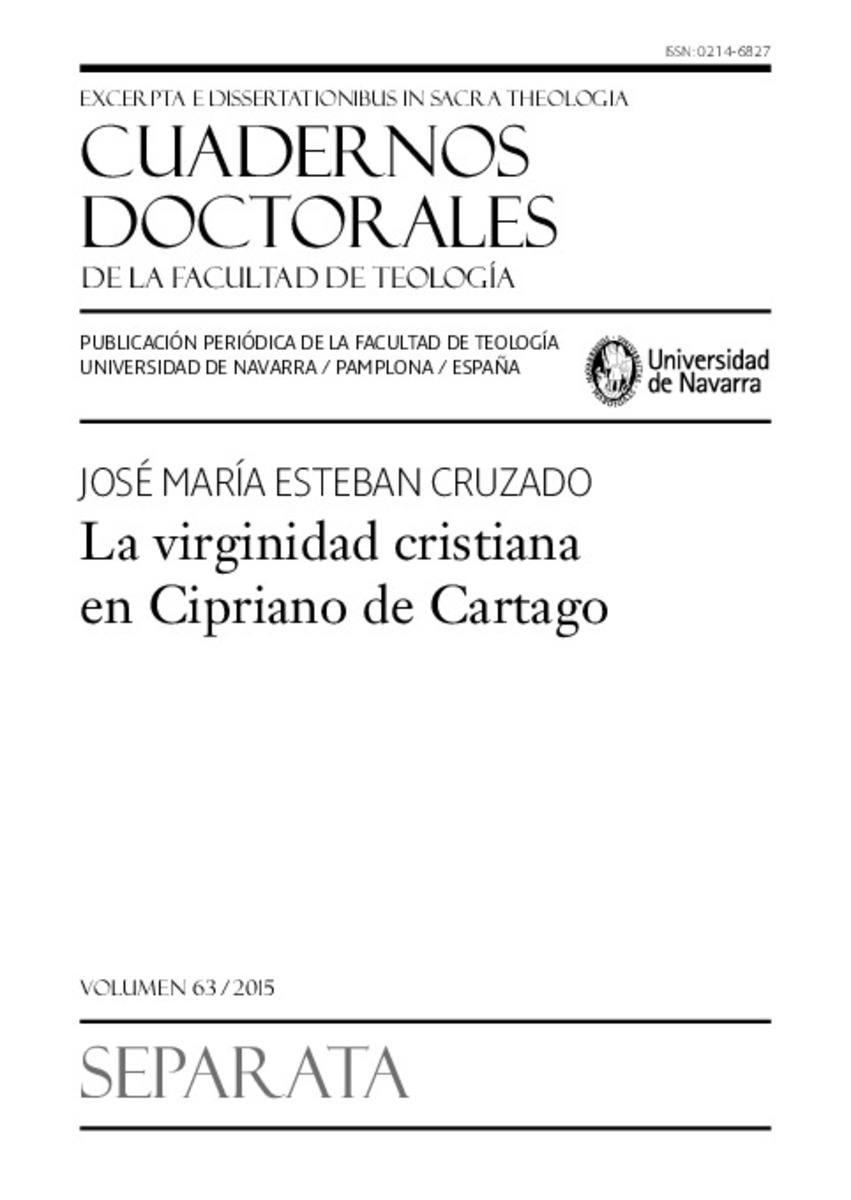Full metadata record
| DC Field | Value | Language |
|---|---|---|
| dc.creator | Esteban-Cruzado, J.M. (José María) | - |
| dc.date.accessioned | 2015-03-26T08:56:04Z | - |
| dc.date.available | 2015-03-26T08:56:04Z | - |
| dc.date.issued | 2014 | - |
| dc.identifier.citation | Esteban-Cruzado, J.M. (2015) ""La virginidad cristiana en Cipriano de Cartago"", Excerpta e dissertationibus in Sacra Theologia, Vol. 63, 173-245. | es_ES |
| dc.identifier.issn | 0214-6827 | - |
| dc.identifier.uri | https://hdl.handle.net/10171/37941 | - |
| dc.description.abstract | Este trabajo aborda la cuestión de la virginidad cristiana en los escritos de Cipriano de Cartago. Se estudia la única obra dedicada por el autor a las vírgenes cristianas –el tratado De habitu virginum– y se valoran las menciones a la virginidad que hace Ci- priano en el resto de sus obras, tratando de concretar el concepto de virginidad que tenía el santo obispo. Todo ello en relación con Tertuliano, su principal fuente de inspiración. Del mismo modo, se hace referencia a la realidad de las vírgenes como grupo cons- tituido y eminente dentro de la comunidad cristiana de Cartago en el siglo III, así como a su relación con la jerarquía eclesiástica. A lo largo del trabajo se aprecia una teología esencialmente común a Tertuliano y a Cipriano, pero al mismo tiempo se observan matices diferenciales entre ambos autores. En concreto, creemos encontrar un ejemplo de dependencia y superación de discípulo a maestro y, lo que es más significativo, un proceso de cristianización del papel de la mujer y de la condición femenina. En este sentido, se puede decir que Cipriano avanza con decisión por el camino abierto por su maestro Tertuliano a la hora de abordar la virginidad cristiana. Con el De habitu virginum, principalmente, y con las diversas referencias al estado virginal que aparecen en el resto de su producción, Cipriano desarrolla por primera vez en la literatura cristiana de lengua latina elementos de una disciplina aplicable a las vírgenes, así como elementos para una teología de la virginidad. | es_ES |
| dc.description.abstract | This dissertation examines Cyprian of Carthage’s writings on Christian virginity. We study his writing on Christian virgins –the treatise De habitu virginum– and also consider Cyprian’s references to virginity in all his other works in order to specify the holy Bishop’s concept of virginity. Discussing the influence of Tertullian, Cyprian’s main source of inspiration, and making reference to the reality of the virgins as an established and prominent group within the Carthaginian Christian community in the third century, as well as their relationship with the church hierarchy. In this work, one can appreciate a common theology to both Tertullian and Cyprian, but distinguishing nuances are also observed. Specifically, we find an example of dependence and master exceedance, and more significantly, a process of Christianization of the role of women. In this sense, one can say that Cyprian is leading his master Tertullian when addressing Christian virginity. With his treatise De habitu virginum, and his references to the virgin state in all his writings, Cyprian develops for the first time in the Latin language Christian literature elements particularly applicable to virgins, and elements for a theology of virginity. | es_ES |
| dc.language.iso | spa | es_ES |
| dc.publisher | Servicio de Publicaciones de la Universidad de Navarra | es_ES |
| dc.rights | info:eu-repo/semantics/openAccess | es_ES |
| dc.subject | Materias Investigacion::Teología y Ciencias religiosas | es_ES |
| dc.subject | Cipriano de Cartago | es_ES |
| dc.subject | Virginidad cristiana | es_ES |
| dc.subject | Tertuliano | es_ES |
| dc.subject | Cyprian of Carthage | es_ES |
| dc.subject | Christian virginity, | es_ES |
| dc.subject | Tertullian | es_ES |
| dc.title | La virginidad cristiana en Cipriano de Cartago | es_ES |
| dc.type | info:eu-repo/semantics/article | es_ES |
Files in This Item:
Statistics and impact
Items in Dadun are protected by copyright, with all rights reserved, unless otherwise indicated.






